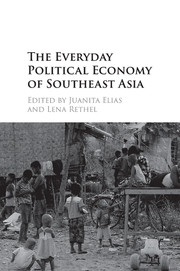Book contents
- Frontmatter
- Epigraph
- Contents
- List of Figures and Map
- List of Tables
- Notes on Contributors
- Acknowledgements
- Part I Introduction
- Part II From Development to Multiple Modernities
- Part III Widening and Deepening Markets
- Part IV People, Mobilities and Work
- 8 From Formal Employment to Street Vending: Malaysian Women's Labour Force Participation over the Life Course
- 9 Everyday Identities in Motion: Situating Malaysians within the ‘War for Talent’
- 10 Regional Disputes over the Transnationalization of Domestic Labour: Malaysia's ‘Maid Shortage’ and Foreign Relations with Indonesia and Cambodia
- 11 Enforcing Socioeconomic Rights: Everyday Agency, Resistance and Community Resources among Indonesian Migrant Domestic Workers in Hong Kong
- Part V Conclusion
- Index
- References
11 - Enforcing Socioeconomic Rights: Everyday Agency, Resistance and Community Resources among Indonesian Migrant Domestic Workers in Hong Kong
from Part IV - People, Mobilities and Work
Published online by Cambridge University Press: 05 August 2016
- Frontmatter
- Epigraph
- Contents
- List of Figures and Map
- List of Tables
- Notes on Contributors
- Acknowledgements
- Part I Introduction
- Part II From Development to Multiple Modernities
- Part III Widening and Deepening Markets
- Part IV People, Mobilities and Work
- 8 From Formal Employment to Street Vending: Malaysian Women's Labour Force Participation over the Life Course
- 9 Everyday Identities in Motion: Situating Malaysians within the ‘War for Talent’
- 10 Regional Disputes over the Transnationalization of Domestic Labour: Malaysia's ‘Maid Shortage’ and Foreign Relations with Indonesia and Cambodia
- 11 Enforcing Socioeconomic Rights: Everyday Agency, Resistance and Community Resources among Indonesian Migrant Domestic Workers in Hong Kong
- Part V Conclusion
- Index
- References
Summary
Introduction
There are currently over 320,000 full-time, live-in migrant domestic workers (MDWs) in Hong Kong, the vast majority of whom are from Southeast Asia. In recent years, women from the Philippines and Indonesia have constituted 48 per cent and 49 per cent, respectively, of the MDW population, with women from Thailand, Sri Lanka and Nepal making up most of the remainder (Immigration Department 2012). These women and previous generations of women from Southeast Asia account for a significant proportion of the intra-Asia migration of workers, being at the same time a part of the widely observed feminization of migration (see also Elias and Louth, this volume). In the social fabric of Hong Kong, their arrival in ever-increasing numbers, especially since the second half of the 1980s, also marked a sea change in which household chores, child and elder care were commoditized to the extent that in approximately one in eight Hong Kong households an MDW carries out or helps with these tasks.
The nature of domestic work, its private location and the dispersal of its workers, very often as single employees in a household, coalesce to produce a vulnerability that is, in many parts of Asia, worsened by live-in arrangements which may have an impact on access to unions or to help and advice. This vulnerability is why the International Labour Organization has identified women domestic workers as one of the three most vulnerable groups of migrant workers (ILO 2004) and why a Domestic Workers’ Convention has now been adopted (ILO number 189). This convention and the longer-standing UN Convention on the Protection of the Rights of All Migrant Workers and Members of their Families (1990) have had some indirect impact in Hong Kong in terms of consciousness raising and lobbying. NGOs and migrant workers’ unions, which in Hong Kong are permitted the political space in which to establish themselves and pursue their activities, have invoked both conventions in their ongoing campaigns and, arguably, drawn legitimacy from them in fighting two recent major issues: the exclusion of MDWs from the right of abode (akin to permanent residency) (Vallejos and Domingo v Commissioner of Registration 2011) and the exclusion of domestic work from the minimum wage regulations.
- Type
- Chapter
- Information
- The Everyday Political Economy of Southeast Asia , pp. 218 - 236Publisher: Cambridge University PressPrint publication year: 2016
References
- 3
- Cited by



